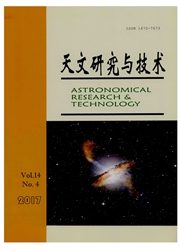

 中文摘要:
中文摘要:
Mg超丰恒星([Mg/Fe]>1.0)的特殊丰度模式无法用普通恒星的Mg元素起源和银河系化学演化机制解释。对这类特殊天体的起源和演化及化学丰度性质的研究,有助于深化理解恒星核合成及星系演化中一些特殊过程。首先介绍了目前文献中由高分辨率光谱证认的Mg超丰恒星,并对这些恒星的大气参数、运动学参数和化学丰度特征等性质及其起源机制进行了分析。其次统计了在斯隆巡天数据中系统搜寻的Mg超丰恒星候选体的大气参数和运动学分布特征,并且筛选了其中C超丰的候选体。研究发现绝大部分Mg超丰恒星表现了C超丰;在Mg超丰恒星中,存在中子俘获元素超丰的那些恒星都存在于双星系统中,其演化过程受到了AGB伴星的影响;而没有表现中子俘获元素超丰的那些恒星极有可能起源于第一代低能量超新星,部分恒星具有很高的空间速度,这类空间速度大于300 km/s的Mg超丰恒星可能是搜寻第一代恒星([ Fe/H]<-5.0)的最好样本。
 英文摘要:
英文摘要:
Chemical abundances of stars of ultra high Mg abundances are rather different from those of the vast majority“normal” stars.Their typical abundance pattern cannot be completely explained by current models of stellar origin and evolution.Therefore, detailed studies of chemical abundances of a sufficient amount of such stars can improve our understanding of some special processes of stellar nuclear syntheses and related issues of galaxy evolution.In this paper we first describe stars of ultra high Mg abundances that have been identified in previous research and are suitable for abundance analyses.These stars were identified through High Resolution Spectra (HRS);their chemical-abundance patterns and kinetics have been well studied.We then present our statistical analyses of characteristics of stellar parameters and kinetics of certain candidates for stars of ultra high Mg abundances.The candidates were selected by us from the SDSS.We compare characteristics of the candidates to those of the stars of ultra high Mg abundances identified through HRS.We have selected from the candidates those having ultra high C abundances using their plots of CH(G) index versus (g-r)0.We find that all of our candidates show ultra high C abundances except a small fraction.We notice that among stars of ultra high Mg abundances those showing ultra high abundances of elements generated through neutron capture almost all belong to binary-star systems, suggesting that their chemical-evolution processes are affected by their AGB ( Asymptotic Giant Branch) companions.In contrast, our analysis reveals that other stars of ultra high Mg abundances mostly have high motion speeds, which indicates their origins from materials ejected by low-energy supernovae.Our candidates of motion speeds more than 300km/s should thus constitute an excellent sample within which stars of the first generation ( [ Fe/H]〈-5.0) in the Galaxy are to be identified.
 同期刊论文项目
同期刊论文项目
 同项目期刊论文
同项目期刊论文
 期刊信息
期刊信息
